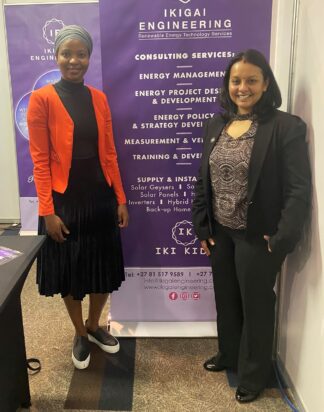
Devaksha Maharaj is the founder and Managing Director of IKIGAI Engineering, a consultancy offering energy management advisory services to households and companies. Their services include measurement and verification as well as installation and maintenance in the electrical and renewable energy sectors.
In the course of her career, Devaksha has had to cross several barriers as a woman in a male-dominated sector. It started at home: coming from a very traditional background, her aunt did not understand why she wants to do “a man’s job”. A bursary from ESKOM allowed Devaksha to study engineering at the University of KwaZulu-Natal. After completing her bachelor’s degree, she worked at different power stations and smelters before changing to consulting.
Dealing with toxic situations at work
At her previous workplace, Devaksha experienced gender-based discrimination by a male superior, who she later found out was notorious for his inappropriate behaviour towards women. But nobody dared to speak up, out of fear of losing their jobs. Devaksha pushed back, which resulted in her being suspended. She launched a grievance procedure and finally decided to leave that company – a tough decision, because she had loved her job.
During that difficult time Devaksha came to realize two things: Firstly, that South Africa does not support women in cases like hers. She put a lot of money into filing her legal complaint and finally had to drop the case, because taking it to court would have been too expensive. Her advice for other women going through similar situations is to reach out to somebody like her. She says that with the networks she has today, she would be able to deal with the situation differently.
The second lesson she learnt was that she had always given everything for the companies she worked for and got little back, so she decided to start her own business – but first, she had to learn how to be an entrepreneur from scratch. IKIGAI Engineering kicked off in 2018. Besides consultancy services, the company also has a strong focus on training and development and STEM (science, technology, engineering and math) education for kids.
How to get more women into technical jobs?
The STEM courses target kids as young as two years old: “It is important to get the kids interested in the topic at a very young age. And they need to learn that women can do these jobs, too – which is why we go into schools and talk to them, so they can see us”, Devaksha explains.
On being asked what else she considers important to support women in energy careers, Devaksha highlights the role of mentors: many of the women she mentors herself are scared to speak up in a room full of men, an insecurity they work on together. Devaksha’s own mentor is a new mum, like herself, so they can discuss the hardships of combining a career with family life.

Finally, it also takes political change to encourage women to work in the energy sector. Devaksha is therefore part of the Energy Sector Gender Ministerial Advisory Council, which has the role of monitoring the participation of women in the energy sector and reporting to the minister and his executives.
A lot still needs to change, Devaksha says, remembering meetings in which she was asked to take minutes just because she was a woman, even though it was clearly someone else’s job. Her impression is that many females are afraid to push back, but it must be done: “You have to do things very gracefully. But make sure they understand who the engineer in the room is.”
This article is the summary of an interview, conducted in the course of our research on opportunities and barriers for women in the power sector in South Africa.
